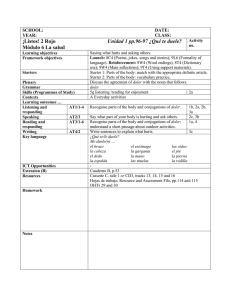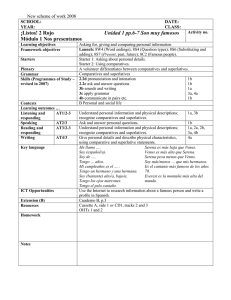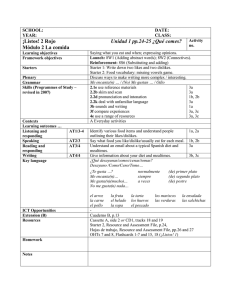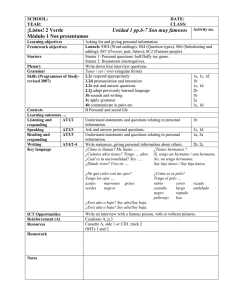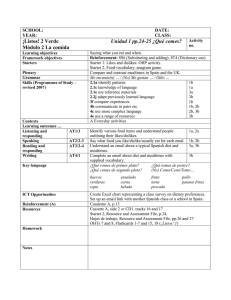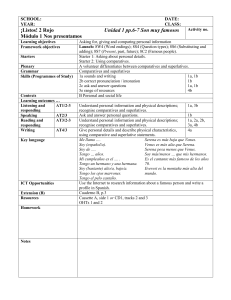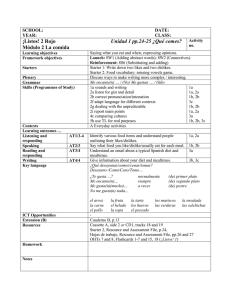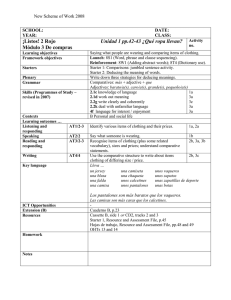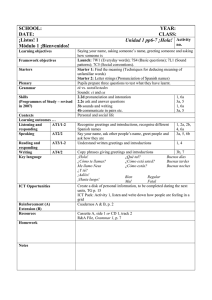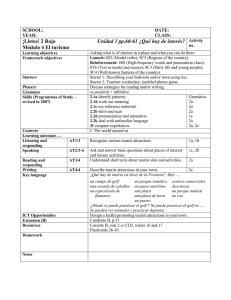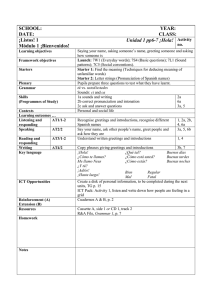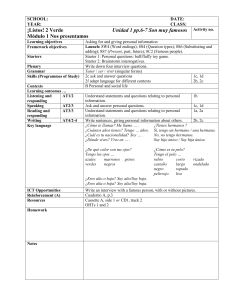Listos! 2 Rojo: M dulo 6 (DOC, 148 KB)
advertisement
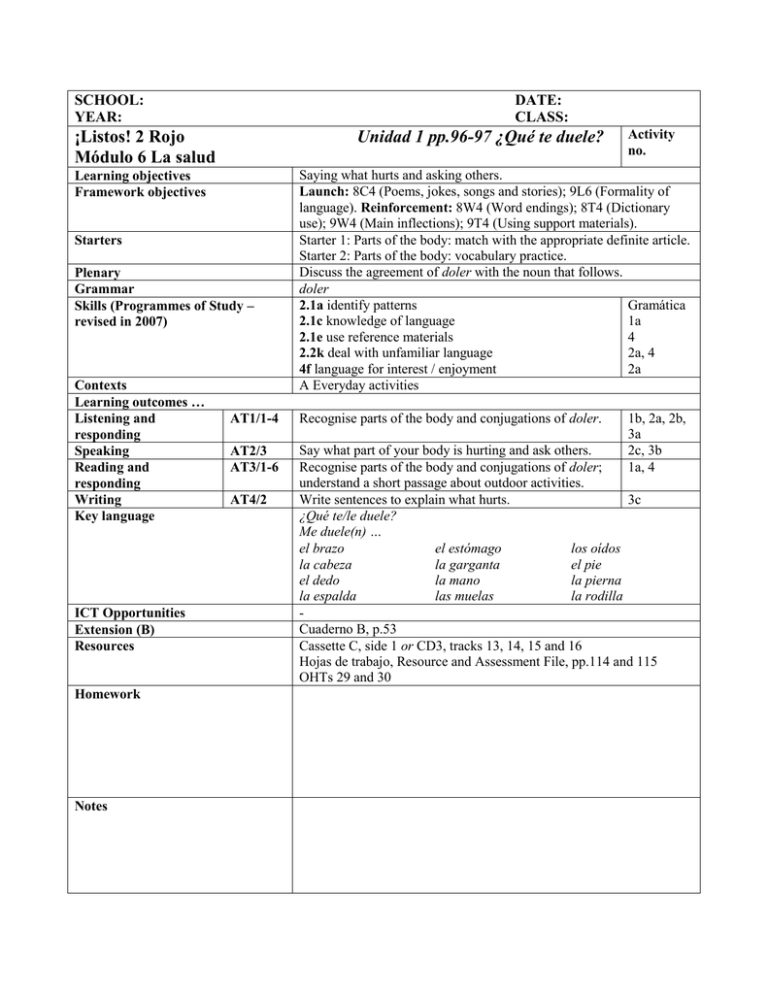
SCHOOL: YEAR: DATE: CLASS: ¡Listos! 2 Rojo Módulo 6 La salud Unidad 1 pp.96-97 ¿Qué te duele? Learning objectives Framework objectives Starters Plenary Grammar Skills (Programmes of Study – revised in 2007) Contexts Learning outcomes … Listening and responding Speaking Reading and responding Writing Key language ICT Opportunities Extension (B) Resources Homework Notes Activity no. Saying what hurts and asking others. Launch: 8C4 (Poems, jokes, songs and stories); 9L6 (Formality of language). Reinforcement: 8W4 (Word endings); 8T4 (Dictionary use); 9W4 (Main inflections); 9T4 (Using support materials). Starter 1: Parts of the body: match with the appropriate definite article. Starter 2: Parts of the body: vocabulary practice. Discuss the agreement of doler with the noun that follows. doler 2.1a identify patterns Gramática 2.1c knowledge of language 1a 2.1e use reference materials 4 2.2k deal with unfamiliar language 2a, 4 4f language for interest / enjoyment 2a A Everyday activities AT1/1-4 Recognise parts of the body and conjugations of doler. AT2/3 AT3/1-6 Say what part of your body is hurting and ask others. Recognise parts of the body and conjugations of doler; understand a short passage about outdoor activities. Write sentences to explain what hurts. 3c ¿Qué te/le duele? Me duele(n) … el brazo el estómago los oídos la cabeza la garganta el pie el dedo la mano la pierna la espalda las muelas la rodilla Cuaderno B, p.53 Cassette C, side 1 or CD3, tracks 13, 14, 15 and 16 Hojas de trabajo, Resource and Assessment File, pp.114 and 115 OHTs 29 and 30 AT4/2 1b, 2a, 2b, 3a 2c, 3b 1a, 4 SCHOOL: YEAR: DATE: CLASS: ¡Listos! 2 Rojo Módulo 6 La salud Unidad 2 pp.98-99 Me siento mal Learning objectives Framework objectives Starters Plenary Grammar Skills (Programmes of Study – revised in 2007) Contexts Learning outcomes … Listening and responding Speaking Reading and responding Writing Key language ICT Opportunities Extension (B) Resources Homework Notes Activity no. Asking / complaining about ailments using tener and estar. Reinforcement: 8L3 (Relaying gist and detail); 8S6 (Substituting and adding); 8T5 (Writing continuous text); 9T5 (Simple creative writing); 9L3 (Reporting and paraphrasing). Starter 1: Use of tener: write down four possessions. Starter 2: Tengo and estoy: match verb and ailment. Discuss the various verbs used in relation to ailments. tener for ailments estar for ailments 2.2a listen for gist /detail 1a, 3 2.2b skim and scan 5a 2.2g write clearly and coherently 5b, 5c 2.2i reuse language they have met 5c 2.2j adapt previously learned language 5c A Everyday activities AT1/2-5 Recognise various ailments/symptoms that use tener. AT2/3 Describe your own ailments/symptoms and ask others 1b, 4a about theirs. Recognise various ailments/symptoms, including those 2, 5a using tener and estar. Write out a dialogue as practised in the speaking 4b, 5b, 5c exercise; write an absence note to a teacher. ¿Qué te pasa? Estoy … Tengo … Tengo… ¿Qué tal? constipado/a catarro una insolación. enfermo/a fiebre una picadura. Me siento mal. mareado/a gripe la pierna rota. No me siento bien. tos dolor de cabeza. Cuaderno B, p.54 Cassette C, side 1 or CD3, tracks 17 and 18 Hojas de trabajo, Resource and Assessment File, pp.114 and 115 OHTs 31 and 32 Flashcards 43-48 AT3/2-6 AT4/2-6 1a, 3 SCHOOL: YEAR: DATE: CLASS: ¡Listos! 2 Rojo Módulo 6 La salud Unidad 3 pp.100-101 En la farmacia Learning objectives Framework objectives Starters Plenary Grammar Skills (Programmes of Study – revised in 2007) Contexts Learning outcomes … Listening and responding AT1/1-4 Speaking AT2/3-4 Reading and responding Writing AT3/3 Key language AT4/3-4 Buying things at the chemist’s and giving medical advice. Reinforcement: 8S3 (Modal verbs); 9S3 (Different tense modals); 9L6 (Formality of language). Starter 1: Illnesses: revision activity. Starter 2: Match the demonstrative adjective with the medical item. Conjugation of deber: dice game. Present tense of deber 2.2a listen for gist /detail 1b, 3b 2.2d pronunciation and intonation 1a 2.2e ask and answer questions 2a, 3c 3b sounds and writing 1a 3c apply grammar 3c, 3d 4d make link with English 1a A Everyday activities Recognise various medicinal products and their 1a, 1b, 3b containers; understand customers’ medical complaints and the chemist’s advice. Buy and sell items in a chemist’s, explaining symptoms 2a, 3c and giving appropriate advice. Understand customers’ medical complaints and the 3a chemist’s advice. Write out a dialogue between customer and chemist and 2b, 3d give written medical advice. ¿Tiene algo para la diarrea / el dolor de estómago? Deme … una caja de… aspirinas pastillas ICT Opportunities Extension (B) Resources Homework Notes Activity no. un tubo de… crema antiséptica pomada una botella de jarabe para la tos un paquete de tiritas ¿Qué debo hacer? Debes … tomar … este jarabe / esta pomada / estas pastillas. ir… al médico / al dentista / a la cama. ponerte una tirita. Cuaderno B, p.55 Cassette C, side 1 or CD3, tracks 19, 20 and 21 SCHOOL: YEAR: DATE: CLASS: ¡Listos! 2 Rojo Módulo 6 La salud Unidad 4 pp.102-103 Hay que practicar mucho Learning objectives Framework objectives Starters Plenary Grammar Skills (Programmes of Study – revised in 2007) Contexts Learning outcomes … Listening and responding Speaking Reading and responding Writing Key language ICT Opportunities Extension (B) Resources Homework Notes AT1/3 AT2/4 AT3/3-4 AT4/4 Activity no. Saying how long you have been doing something; general advice. Launch: 8L2 (Media listening skills) Reinforcement: 8W5 (Verbs); 8L3 (Relaying gist and detail); 8T5 (Writing continuous text); 9S6 (Multiple-clause sentences); 9L3 (Reporting and paraphrasing). Starter 1: Conjugation of present-tense –ar verbs. Starter 2: Conjugation of jugar: gap-filling activity. Drill ¿Cuánto tiempo hace que …? around the class. Hace … que + verb Hay que … / Tienes que … / Debes … 2.1a identify patterns Gramática 2.2c respond appropriately 3, 4b 2.2g write clearly and coherently 4c 3b sounds and writing 1 3c apply grammar 3, 4c 3d use a range of vocab / structures 3, 4c A Everyday activities Understand people saying how long they have been 2 doing something. Say how long you have been doing various things and 3 ask others. Recognise various activities; understand an interview 1, 4a, 4b about skateboarding. Complete sentences saying what you should / should not 4c do with appropriate verbs. ¿Cuánto tiempo hace que … ? Hace dos años que … juegas al fútbol / baloncesto / tenis Hay que practicar mucho. estudias español / francés Tienes que llevar ropa cómoda. vives en Londres Debes entrenar muchas horas. llevas el pelo corto / largo Cuaderno B, p.56 Cassette C, side 1 or CD3, tracks 22 and 23 SCHOOL: YEAR: DATE: CLASS: Activity no. ¡Listos! 2 Rojo Módulo 6 La salud Unidad 5 pp.104-105 Hay que comer fruta todos los días Learning objectives Framework objectives Talking about healthy living. Launch: 9T6 (Adapting for audience) Reinforcement: 8S3 (Modal verbs); 8S5 (Negative forms and words); 8S7 (Present, past, future); 8S8 (Using high-frequency words and punctuation clues). Starter 1: Categorising verbs by their endings. Starter 2: Hay que and Tienes que: gap-filling activity. Discuss ways of leading a healthy lifestyle. Revising the immediate future 2.1d work out meaning 1 2.2j adapt previously learned language 3, 5b 2.2k deal with unfamiliar language 4 4c use more complex language 5b A Everyday activities Starters Plenary Grammar Skills (Programmes of Study – revised in 2007) Contexts Learning outcomes … Listening and responding Speaking Reading and responding Writing Key language AT1/- - AT2/4 AT3/4-5 Give advice about healthy living. 2 Understand and give opinions on various pieces of 1, 4, 5a advice. Complete and compose sentences to give advice on 3, 5b living healthily; describe your own lifestyle. (No) Debes … (No) Hay que … (No) Tienes que … AT4/4-5 … beber dos litros de agua al día. … comer cinco raciones de fruta o verdura al día. … desayunar todos los días. … dormir ocho horas al día. - … hacer deporte tres veces a la semana. … organizar bien los estudios. … comer chocolate todos los días. … cenar muy tarde. (No) Estoy de acuerdo. ICT Opportunities Extension (B) Resources Homework Notes Cuaderno B, p.57 Starter 1, Resource and Assessment File, p.112 Grammar, Resource and Assessment File, pp.116 and 117 SCHOOL: YEAR: DATE: CLASS: ¡Listos! 2 Rojo Módulo 6 La salud Unidad 6 pp.108-109 ¡Extra! Entrevista con una deportista Learning objectives Framework objectives Starters Plenary Grammar Skills (Programmes of Study – revised in 2007) Contexts Learning outcomes … Listening and responding Speaking Reading and responding Writing Key language ICT Opportunities Extension (B) Resources Homework Notes AT1/6 AT2/6-7 AT3/6 AT4/6-7 Activity no. Reading a longer interview with a sporting champion. Reinforcement: 8S4 (Question types); 8L2 (Media listening skills); 9S4 (Building answers from questions); 9S7 (Different tenses in sentences); 9T5 (Simple creative writing); 9L2 (Recognising rhetorical devices); 9L4 (Questions/text as stimulus to talk). Starter 1: Recognising verbs of varying tenses. Starter 2: Write down four questions suitable for an interview. Discuss strategies for tackling a long text. Review of structures – further examples of preterite and imperfect Questions 2.1d work out meaning 1a, 1b 2.2e ask and answer questions 3a 2.2f initiate / sustain conversations 3a 2h redraft to improve writing 3b 3d use a range of vocab / structures 3a, 3b 4b communicate in pairs etc 3a 4f language for interest / enjoyment 1a 4g use TL for engaging topics 3a, 3b B Personal and social life; D The world of work Understand a similar interview with another professional cyclist. Talk about your own sporting activities and interview others about theirs. Understand a wide range of personal details. 1a, 2 3a 1a, 1b Write out an interview conducted with a classmate about 3b his/her sporting activities. Tuve una caída. Me ayudó un chico. Me casé. Cassette C, side 2 or CD3, tracks 26 and 27
